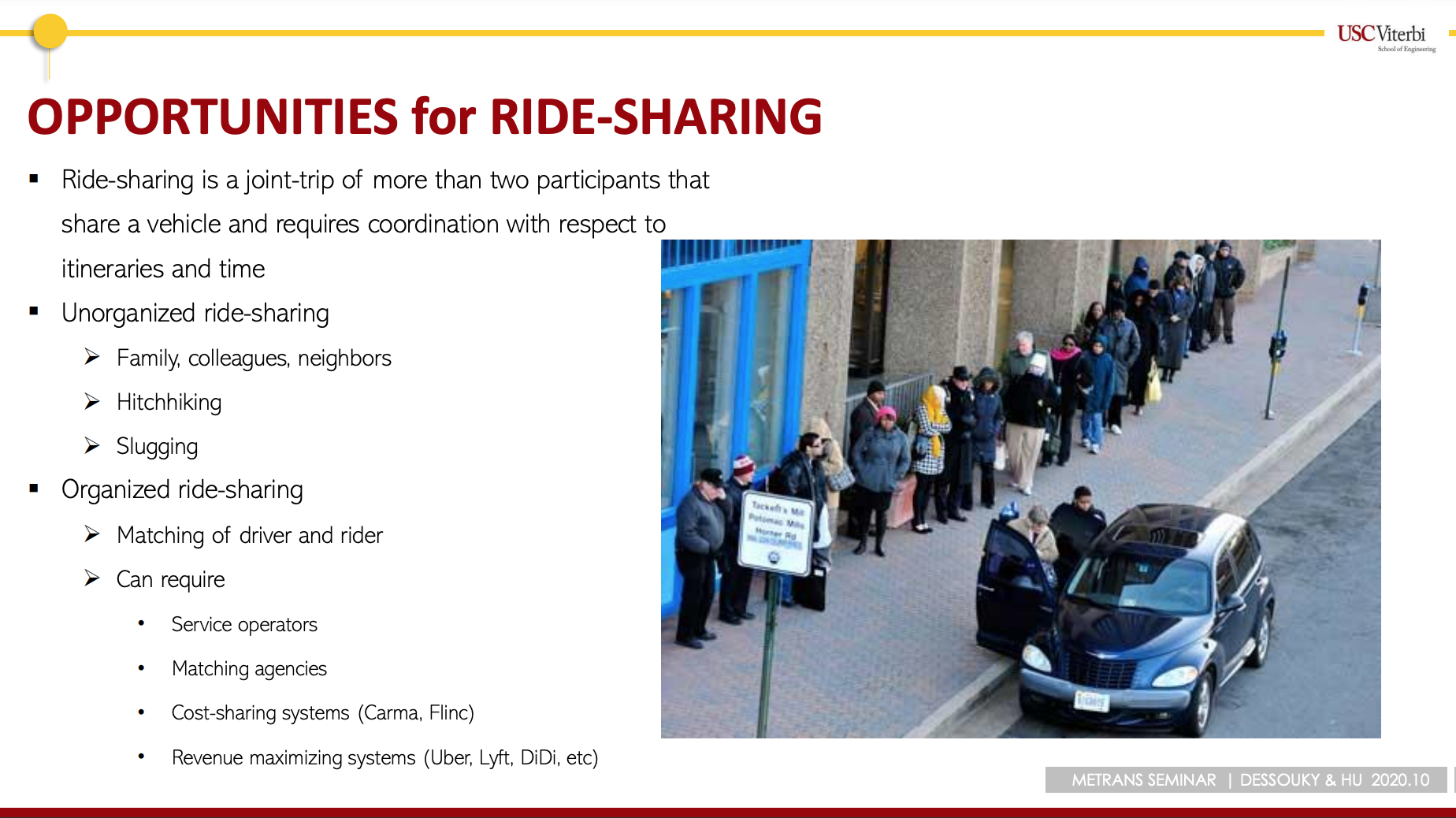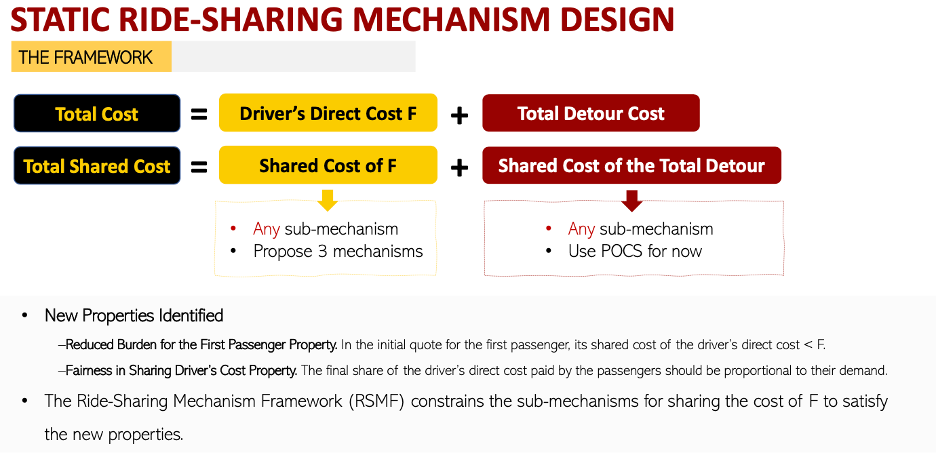News | METRANS, PSR, NCST host Dessouky and Hu for Cost-Sharing Mechanisms for Ride-Sharing Webinar
Stop the VideoNews

METRANS, PSR, NCST host Dessouky and Hu for Cost-Sharing Mechanisms for Ride-Sharing Webinar
Friday, October 30, 2020
by Hayley Rundle, USC, Masters of Urban Planning 2022
On October 22, METRANS, and the Pacific Southwest University Transportation Center (PSR), and the National Center for Sustainable Transportation (NCST), launched the third research seminar for the Fall 2020 webinar series. The National Center for Sustainable Transportation is a national transportation center that provides national leadership in advancing environmentally sustainable transportation through cutting-edge research, direct policy engagement, and education of our future leaders.
At “Cost-Sharing Mechanisms for Ride-Sharing,” Dr. Maged Dessouky and Shichun Hu showcased their ongoing research. Dessouky is a Dean’s Professor and Chair of the Epstein Department of Industrial Systems Engineering, Viterbi School of Engineering, USC. Hu is a USC Ph.D. student studying industrial and systems engineering.

Dr. Maged Dessouky
The motivation for Dessouky and Hu’s research centers around the U.S. Department of Transportation’s estimate that more than 10% of GDP is related to transportation activity and the 2019 Urban Mobility report’s estimate that the cost of congestion in the U.S. is on the order of $160 billion or $960 per commuter and 7 billion hours in delayed time. Hence, as Dessouky explained, there exists a significant amount of unused capacity in the transportation network and emerging information technologies have made available a wealth of real-time and dynamic data about traffic conditions. Dessouky described the objective of the research is to develop a method to determine the cost-share for participants in ridesharing because there currently exists a gap in the literature in this area. A crucial component of a cost-sharing transportation system is the allocation of costs and/or savings to each participant in the system.
Dessouky began the presentation by describing the two opportunities for ride-sharing: unorganized ride-sharing and organized ride-sharing. Unorganized ride-sharing includes families, colleagues, or neighbors riding together to a common destination, hitchhiking, and slugging, people lining up to get in a car with a stranger to share a trip. Slugging is practiced in Washington D.C. and Berkeley to avoid tolls and have access to the carpool lane. Organized ride-sharing is the matching of a driver and rider that can require service operators, matching agencies, cost-sharing systems, and revenue maximizing systems. Uber, Lyft, DiDi, etc. are organized ride-sharing or transportation network companies (TNCs). Consequently, TNCs have had a large impact on congestion, with one 2019 University of Kentucky Report finding that more than half of the 62% increase in weekday traffic delays between 2010 and 2016 were due to Uber and Lyft trips.

Unorganized vs. organized ride-sharing.
Dessouky then went on to describe the setting of the research which is to share the ride costs fairly and without any subsidies, to make sure passengers have no reason to drop out after their fare quote, and to motivate passengers to submit requests early to allow the system to maximize services passengers. Additionally, the research is based upon desirable properties for a cost-sharing mechanism for ride-sharing. These desirable properties include the following:
- Online Fairness: The costs per distance unit are monotonically nonincreasing (in passengers’ arrival order).
- Ex-Post Incentive Compatibility: The best strategy of every passenger is to arrive truthfully (provided that all other passengers arrive truthfully and none change whether they accept).
- Immediate Response: The passengers’ costs are monotonically nonincreasing (in time).
- Budget Balance: The total cost is shared by all (serviced) passengers.
- Individual Rationality: The shared costs of passengers who accepted their initial quotes should never exceed their willingness-to-pay-level.
The POCS mechanism is then used to calculate shared costs. Proportional Online Cost-Sharing (POCS) is a mechanism that provides low fare quotes to passengers directly after they submit ride requests and calculates their actual fares directly before their rides. POCS is a mix of marginal cost-sharing (with respect to coalitions) and proportional cost-sharing (with respect to passengers within a coalition).
Hu then presented the static ride-sharing mechanism design where all the information about the passengers is known in advance. The Ride-Sharing Mechanism Framework (RSMF) is based upon the following:
- Total Cost = Driver’s Direct Cost F + Total Detour Cost
- Total Shared Cost = Shared Cost F + Shared Cost of the Total Detour
Each RSMF was then analyzed in detail using three different mechanisms: driver-out-of-coalition, driver-in-coalition, and passengers predicting.

A breakdown of the static ride-sharing mechanism design.
Each mechanism has its advantages and disadvantages. Using the driver-out-of-coalition and driver-in-coalition mechanisms, all five desirable properties are satisfied and Fairness in Sharing Driver’s Cost property holds. However, the driver-out-of-coalition mechanism fails to reduce the burden of the first passenger while under the driver-in-coalition mechanism the Reduced Burden for the First Passenger property holds. Consequently, the driver-in-coalition mechanism fails to fully recover the driver’s cost. Under the passengers predicting mechanism, which predicts the total number of passengers by adapting a robust optimization method, four of the five desirable properties are satisfied, the Fairness in Sharing Driver’s Cost property holds, and the Reduced Burden for the First Passenger property holds. The Budget Balance property is lost; however, increased prediction accuracy can mitigate this issue.
The research then studied how the static ride-sharing mechanism design would be impacted by time constraints using the following equation:
- Total Shared Cost = Shared Cost of F + Shared Cost of the Total Detour + Discount Component
The discount component would be discounts that are received whenever inconveniences occur. The two discount mechanisms are a basic discount (BD), the new passenger is responsible for all inconvenience costs of previous passengers, and an inconvenience cost based discount (ICBD), passengers form coalitions to share the inconvenience costs. Under the BD mechanism, three of the five desirable properties are satisfied, Fairness in Sharing Driver’s Cost property holds, Reduced Burden for the First Passenger property holds, and passengers are not responsible for the inconveniences costs that are not caused by themselves. The Online Fairness and Ex-Post Incentive Compatibility properties are lost. Under the ICBD mechanism, four of the five desirable properties are satisfied, Fairness in Sharing Driver’s Cost property holds, and Reduced Burden For the First Passenger property holds. The Online Fairness property is lost, passengers with high tolerance for time may not get any discounts while being responsible for part of the total inconvenience cost, and this mechanism requires more memory and time in simulation. Overall, the BD mechanism outperforms the ICBD mechanism in shared cost per passenger and number of requests served while the ICBD mechanism leads to a more distributed system.

The impact of a time constraint on the cost-sharing mechanism.
The experiment found the driver-in-coalition mechanisms produces the lowest average passenger cost, the driver-out-of-coalition mechanism recovers all of the driver’s cost, and the passengers predicting mechanism balances the driver and passengers’ cost. Thus, the passengers predicting scenario should be used for further experiments in comparing the discount methods.
To wrap up the webinar, Hu highlighted the future direction of the research. The research team hopes to develop cost-sharing mechanisms for the dynamic case and develop a dynamic ride-sharing routing method. Then combine the cost-sharing mechanisms and the routing method in the dynamic case and test their performances.
If you would like to watch the full video of the event or access the presentation slides, please click here.
About the Author:
Hayley Rundle is a first-year Master of Urban Planning student at the USC Price School of Public Policy, concentrating in Mobility and Transportation Planning. She is interested in sustainable transportation planning to improve environmental quality, equity, and mobility for all. Hayley serves as the team leader for the METRANS Industry Engagement and contributes to the Student Research Team, summarizing cutting edge transportation research projects and findings for the upcoming METRANS Fast Facts for Students series.
News Archive
- December (1)
- November (6)
- October (4)
- September (2)
- August (3)
- July (4)
- June (3)
- May (7)
- April (8)
- March (11)
- February (8)
- January (7)
- December (7)
- November (8)
- October (11)
- September (11)
- August (4)
- July (10)
- June (9)
- May (2)
- April (12)
- March (8)
- February (7)
- January (11)
- December (11)
- November (5)
- October (16)
- September (7)
- August (5)
- July (13)
- June (5)
- May (5)
- April (7)
- March (5)
- February (3)
- January (4)
- December (4)
- November (5)
- October (5)
- September (4)
- August (4)
- July (6)
- June (8)
- May (4)
- April (6)
- March (6)
- February (7)
- January (7)
- December (8)
- November (8)
- October (8)
- September (15)
- August (5)
- July (6)
- June (7)
- May (5)
- April (8)
- March (7)
- February (10)
- January (12)















